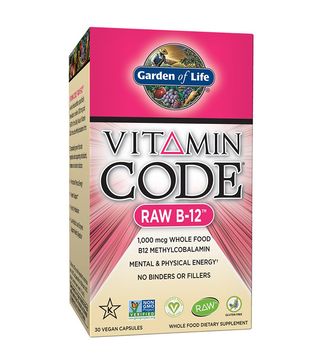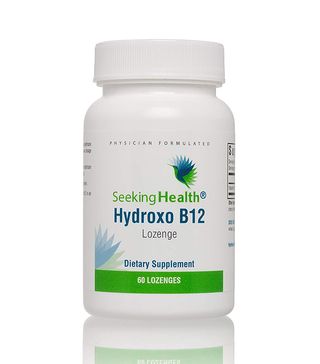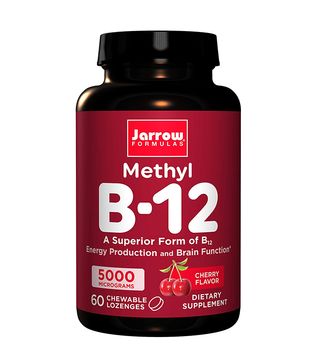If You Want More Energy, Eat These 10 Foods Rich in This Essential Vitamin

A balanced diet is key to maintaining a healthy body and trying to avoid any health issues. We talk about what to eat if you want good skin, better focus, a healthier heart, and so much more. But do you know if you're getting enough of a crucial nutrient: vitamin B12?
"Vitamin B12 is a water-soluble vitamin that plays a major role in DNA synthesis, nervous system function, and red blood cell formation," explains Claire Virga, MS, RDN, of Rooted Wellness. "We need vitamin B12 to keep our nerve and red blood cells healthy and to create new DNA. Our bodies can't make vitamin B12 so we must get B12 from dietary sources and supplements."

The thing is, you might not know you have a deficiency straight off the bat. "You could have low B12 for years before an actual deficiency symptom shows up," says Robin Foroutan, MD, RDN, HHC, a spokesperson for the Academy of Nutrition and Dietetics.
A deficiency can lead to anemia and nervous system complications that cause symptoms like fatigue, numbness, tingling, muscle weakness, and shortness of breath as well as cognitive complications like memory loss and depression, Virga adds. And if left untreated for a long period of time, it can lead to severe, irreversible nerve damage in some cases.
Since vitamin B12 is found in meat, seafood, and dairy, there are some people with dietary restrictions who are more susceptible to a vitamin B12 deficiency—vegans and vegetarians, for example. "It's probably the most-difficult-to-absorb vitamin, and it's not found everywhere in food," Foroutan says. "Mostly animal foods are sources of B12, but because it's so difficult to absorb, a lot of people end up with low levels even if they might be eating the right amount of B12 foods. The people who are most at risk for B12 deficiencies or chronic low-grade insufficiencies are the vegetarians and vegans, anybody avoiding red meat and people who take acid-blocking medication or routinely take antacids."

Since absorption can be difficult with this vitamin, people with digestive problems or inflammation in the digestive tract might not be able to absorb it fully. Not to mention as you get older, your ability to absorb B12 decreases. Additionally, pregnant and lactating women may need more vitamin B12 to support the cognitive development and healthy growth of their baby. "A B12 deficiency during pregnancy can cause developmental abnormalities, neural tube defects, preeclampsia, and other complications," Virga says. "Pregnant women should look for a prenatal multivitamin containing vitamin B12."
So how can you make sure you're getting enough B12, even if you're not exhibiting symptoms of a deficiency? A blood test at your doctor's office will let you know. But if you're looking for more sources of vitamin B12 in your life, both Virga and Foroutan shared some common foods below.
1. Tuna

"A three-ounce serving of bluefin tuna contains more than 100% of the daily value (DV) of B12," Virga says. "Tuna is also a great source of protein, omega-3 fatty acids, and micronutrients like selenium and vitamin B6."
2. Beef
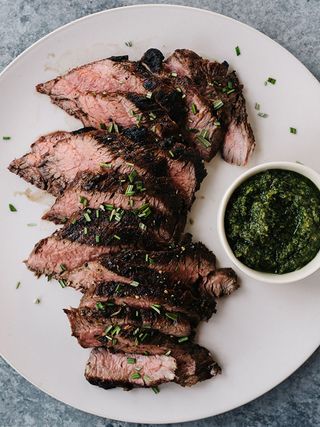
Virga says most cuts of beef are good sources of vitamin B12, but in particular, the cuts of meat lower in fat (like ground beef and beef short ribs) tend to have higher levels. Foroutan also adds that other sources of meat and cuts, such as lamb and organ meats (liver and kidney) are also high in B12.
3. Eggs

The yolk is key here, according to Foroutan. "Two large eggs contain around 40% of the DV for B12," Virga adds. "Hardboiled eggs are one of my favorite on-the-go snacks. Boil eggs at the beginning of the week and store them in the fridge for quick snacks or for adding to salads for extra protein and vitamin B12."
4. Salmon

"One three-ounce serving of sockeye salmon contains approximately 200% of the DV for vitamin B12!" Virga says. "Salmon is also an excellent source of omega-3 fatty acids, which we need to support brain and heart health."
Other fish that contain the vitamin include sardines and rainbow trout, according to Foroutan.
5. Fortified Foods

These might be a helpful option for vegans and vegetarians. "Foods like cereals, non-dairy milks, and vegan spreads are often fortified with vitamin B12," Virga explains. "Fortification of foods involves adding a nutrient to a food that is not naturally occurring in the food."
6. Nutritional Yeast

This one's another good choice for vegetarians and vegans. I am neither, but I love using nutritional yeast as a topping on popcorn because it tastes cheesy and nutty. "Nutritional yeast is often fortified with vitamin B12, but the vitamin content varies by brand, so it's important to check the ingredient list to ensure it contains the vitamin," Virga advises.
7. Clams

Virga says three ounces of cooked clams contain 3540% of the DV for vitamin B12. And if you don't love clams, Foroutan says other shellfish like oysters and mussels are a good source, too.
8. Dairy-Based Yogurt

"Dairy-based yogurts are also good sources of vitamin B12," Virga says. "Most flavored yogurts have a ton of added sugar, so I recommend going with plain yogurt and sweetening it with fresh fruit."
9. Dairy Milk
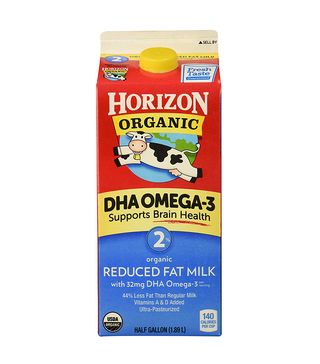
Virga says one glass of cow's milk contains 50% of the recommended dietary allowance for vitamin B12. Drink up!
10. Cheese

Yes, please. "One ounce of Swiss cheese contains 0.9 micrograms of B12, which equates to approximately 38% of the DV of B12," Virga says.
If You Have to Take Supplements
For people who might not be able to get their vitamin B12 intake from what they eat alone because they have dietary restrictions, are older, pregnant, or have another condition, you can turn to supplements for help. You'll want to discuss with your doctor the correct dosage and type or brand of vitamin, but Foroutan has some tips. "When you're looking for supplements, there are a lot of different forms of B12," she explains. "The cheapest and most common is called cyanocobalamin. It is not great. It's not well utilized by your cells. So a better one to use is hydroxocobalamin or methylcobalamin. The other thing is that when you get a B12 supplement, you'll see that it's like 10,000 times the recommended daily allowance, and it gives a lot of people pause, like why is this such a mega dose? It goes back to that vitamin not being well absorbed. So the supplements provide a huge dose knowing that you'll absorb just some of it."
Take a look at a few recommended vitamins below:
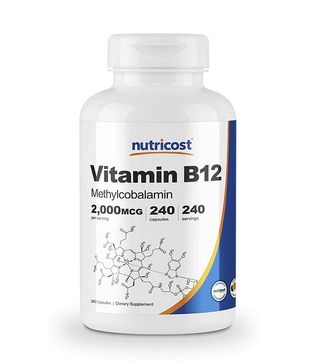
Next up: 14 Sneaky Signs You May Have This Common Vitamin Deficiency
This article was originally published at an earlier date and has since been updated.
Disclaimer
This article is provided for informational purposes only and is not intended to be used in the place of advice of your physician or other medical professionals. You should always consult with your doctor or healthcare provider first with any health-related questions.
Sarah is lifestyle writer and editor with over 10 years of experience covering health and wellness, interior design, food, beauty, and tech. Born and raised in Los Angeles, she attended New York University and lived in New York for 12 years before returning to L.A. in 2019. In addition to her work on THE/THIRTY and Who What Wear, she held editor roles at Apartment Therapy, Real Simple, House Beautiful, Elle Decor, and The Bump (sister site of The Knot). She has a passion for health and wellness, but she especially loves writing about mental health. Her self-care routine consists of five things: a good workout, “me” time on the regular, an intriguing book/podcast/playlist to unwind after a long day, naps, and decorating her home.
-
 I Only Ate Sakara Life Meals for 30 Days—Here Are 7 Things That Happened
I Only Ate Sakara Life Meals for 30 Days—Here Are 7 Things That HappenedThe brand's 30-Day Fall Reset is finally here.
By Erin Jahns
-
 The 6 Warning Signs You're Not Getting Enough Protein
The 6 Warning Signs You're Not Getting Enough ProteinAnd what to eat to up your intake.
By Sarah Yang
-
 Everything This Professional Ballet Dancer Eats to Fuel Her For Performances
Everything This Professional Ballet Dancer Eats to Fuel Her For PerformancesHer grocery staples include high-quality French butter.
By Candice Aman
-
 These 8 Foods Are the Worst for Rosacea—Here's What to Eat Instead
These 8 Foods Are the Worst for Rosacea—Here's What to Eat InsteadControl those flare-ups.
By Sarah Yang
-
 15 Things That Cause Bloating and How to Get Rid of It ASAP
15 Things That Cause Bloating and How to Get Rid of It ASAPTry these.
By Sarah Yang
-
 Is the Alkaline Diet Overhyped? What Experts Want You to Know
Is the Alkaline Diet Overhyped? What Experts Want You to KnowHere's how it works.
By Sarah Yang
-
 I'm an Imperfect Dietitian and My Key to Eating Healthy Meals Is Convenience
I'm an Imperfect Dietitian and My Key to Eating Healthy Meals Is ConvenienceTake a peek at my weekly grocery staples.
By Candice Aman
-
 Avoid These 6 Foods—They'll Wreck Your Gut Health
Avoid These 6 Foods—They'll Wreck Your Gut HealthWhat to eat instead.
By Sarah Yang

